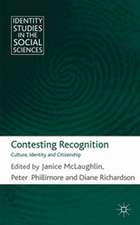Egalitarian Rights Recognition: A Political Theory of Human Rights: International Political Theory
Autor Matt Hannen Limba Engleză Hardback – 12 sep 2016
| Toate formatele și edițiile | Preț | Express |
|---|---|---|
| Paperback (1) | 634.49 lei 43-57 zile | |
| Palgrave Macmillan UK – 12 iun 2018 | 634.49 lei 43-57 zile | |
| Hardback (1) | 638.89 lei 43-57 zile | |
| Palgrave Macmillan UK – 12 sep 2016 | 638.89 lei 43-57 zile |
Din seria International Political Theory
- 18%
 Preț: 1231.47 lei
Preț: 1231.47 lei -
 Preț: 357.88 lei
Preț: 357.88 lei - 15%
 Preț: 636.45 lei
Preț: 636.45 lei -
 Preț: 158.77 lei
Preț: 158.77 lei -
 Preț: 358.17 lei
Preț: 358.17 lei - 9%
 Preț: 737.57 lei
Preț: 737.57 lei -
 Preț: 382.95 lei
Preț: 382.95 lei - 15%
 Preț: 466.31 lei
Preț: 466.31 lei - 15%
 Preț: 643.00 lei
Preț: 643.00 lei -
 Preț: 213.97 lei
Preț: 213.97 lei -
 Preț: 385.84 lei
Preț: 385.84 lei - 15%
 Preț: 641.03 lei
Preț: 641.03 lei -
 Preț: 385.84 lei
Preț: 385.84 lei -
 Preț: 394.87 lei
Preț: 394.87 lei - 18%
 Preț: 890.37 lei
Preț: 890.37 lei - 15%
 Preț: 634.14 lei
Preț: 634.14 lei - 15%
 Preț: 635.15 lei
Preț: 635.15 lei - 18%
 Preț: 727.00 lei
Preț: 727.00 lei -
 Preț: 388.72 lei
Preț: 388.72 lei - 15%
 Preț: 642.51 lei
Preț: 642.51 lei - 18%
 Preț: 729.36 lei
Preț: 729.36 lei - 15%
 Preț: 639.08 lei
Preț: 639.08 lei -
 Preț: 391.61 lei
Preț: 391.61 lei -
 Preț: 394.51 lei
Preț: 394.51 lei -
 Preț: 383.93 lei
Preț: 383.93 lei -
 Preț: 389.70 lei
Preț: 389.70 lei - 18%
 Preț: 736.50 lei
Preț: 736.50 lei -
 Preț: 385.62 lei
Preț: 385.62 lei -
 Preț: 388.52 lei
Preț: 388.52 lei -
 Preț: 392.60 lei
Preț: 392.60 lei -
 Preț: 384.86 lei
Preț: 384.86 lei -
 Preț: 390.63 lei
Preț: 390.63 lei
Preț: 638.89 lei
Preț vechi: 751.64 lei
-15% Nou
Puncte Express: 958
Preț estimativ în valută:
122.25€ • 127.96$ • 101.75£
122.25€ • 127.96$ • 101.75£
Carte tipărită la comandă
Livrare economică 31 martie-14 aprilie
Preluare comenzi: 021 569.72.76
Specificații
ISBN-13: 9781137595966
ISBN-10: 1137595965
Pagini: 203
Ilustrații: IX, 197 p.
Dimensiuni: 148 x 210 x 22 mm
Greutate: 0.38 kg
Ediția:1st ed. 2016
Editura: Palgrave Macmillan UK
Colecția Palgrave Macmillan
Seria International Political Theory
Locul publicării:London, United Kingdom
ISBN-10: 1137595965
Pagini: 203
Ilustrații: IX, 197 p.
Dimensiuni: 148 x 210 x 22 mm
Greutate: 0.38 kg
Ediția:1st ed. 2016
Editura: Palgrave Macmillan UK
Colecția Palgrave Macmillan
Seria International Political Theory
Locul publicării:London, United Kingdom
Cuprins
Introduction.- Chapter 1: T.H. Green and the social recognition of rights.- Chapter 2: Hannah Arendt: the paradox of the Rights of Man, the political community, judgment, and recognition.- Chapter 3: Societies of rights: what does a political community look like?.- Chapter 4: Rights recognition and cosmopolitanism: global egalitarian rights recognition.- Conclusion-. Bibliography.- Index.
Notă biografică
Matt Hann received his PhD in political theory, focussing on the theoretical justifications of human rights, in 2014 from Durham University, UK. Before this, he studied at Durham and at Universität Konstanz, Germany. He has published work in journals including Political Theory and the Journal of Moral Philosophy.
Textul de pe ultima copertă
This book takes a distinctive and innovative approach to a relatively under-explored question, namely: Why do we have human rights? Much political discourse simply proceeds from the idea that humans have rights because they are human without seriously interrogating this notion. Egalitarian Rights Recognition offers an account of how human rights are created and how they may be seen to be legitimate: rights are created through social recognition. By combining readings of 19th Century English philosopher T.H. Green with 20th Century political theorist Hannah Arendt, the author constructs a new theory of the social recognition of rights. He challenges both the standard ‘natural rights’ approach and also the main accounts of the social recognition of rights which tend to portray social recognition as settled norms or established ways of acting. In contrast, Hann puts forward a 10-point account of the dynamic and contingent social recognition of human rights,which emphasises the importance of meaningful socio-economic equality.
Caracteristici
Provides a detailed account that fills a gap in the literature considering why we have human rights Develops the school of thought beyond considering human rights as intrinsic because we are human Original in its approach in combining a study of Hannah Arendt with T.H. Green
















